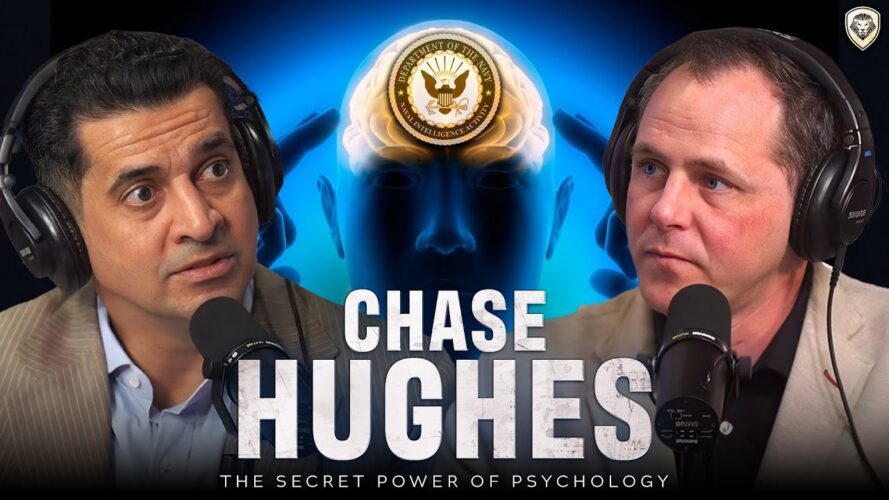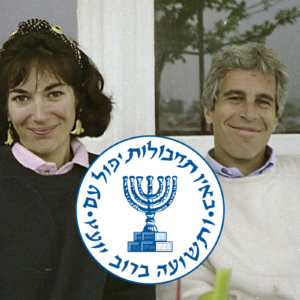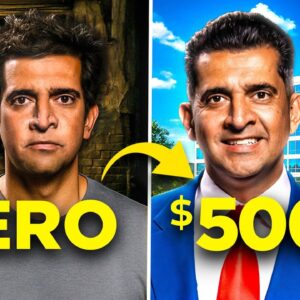In this episode of the PBD Podcast, Patrick Bet-David sits down with Chase Hughes, a world-renowned expert in behavioral profiling and military intelligence, to uncover the chilling realities of CIA mind control experiments, psychological warfare, and covert government operations. From MK Ultra to SCOP tactics like “ghost voices” in war, Hughes reveals jaw-dropping insights into how perception and permission are manipulated to control human behavior.
This eye-opening episode explores the dark side of human psychology, exposing untold strategies of PSYOPS, intelligence, and influence that will leave you questioning everything you know about control and the human mind.
Disclaimer: The information provided in this interview is for informational purposes only and is not intended as medical advice. Any medications or treatments mentioned should not be taken or implemented without consulting a qualified medical professional. Always seek the guidance of your doctor or healthcare provider before making decisions about your health or starting any new medications or treatments.
Subscribe to PBD’s YouTube channel today for every episode LIVE or On Demand!
Episode Summary
MK Ultra: The Psychological Arms Race
Hughes describes MK Ultra as the starting point of a “psychological arms race.” This CIA program, now widely acknowledged, sought to explore mind control through drugs, hypnosis, and behavioral conditioning. One particularly haunting experiment aimed to hypnotize individuals, including a German submarine captain, to execute covert operations against their own forces.
He emphasizes how manipulation is possible on a large scale, noting, “The average person could be talked into murder in about an hour.” This highlights the fragility of human decision-making under the right psychological pressures.
The Mechanics of Influence
Hughes dives into the fundamental principles behind manipulation and influence, summarizing them as FATE:
- Focus – Drawing attention to a specific idea or outcome.
- Authority – Leveraging perceived expertise or command.
- Tribe – Creating a sense of belonging or alignment.
- Emotion – Exploiting fear, guilt, or other powerful feelings.
He compares these principles to everyday scenarios, such as sales tactics or even the famous Milgram experiment, which demonstrated people’s willingness to follow orders, even to the point of inflicting harm.
Psychological Experiments: From Hypnosis to Identity Control
The interview touches on infamous experiments like the Milgram study and others tied to MK Ultra, where individuals were reportedly hypnotized to perform actions against their will. The program allegedly explored creating alternate personalities to carry out missions without the primary identity being aware—a precursor to what Hughes calls “programmed assassins.”
Modern PSYOPS and Media Manipulation
Hughes discusses how governments and organizations use psychological tactics today, often normalizing controversial ideas through incremental exposure in media. He warns against accepting repetitive narratives in news coverage, advocating for critical thinking and distinguishing between “reporting” and “repeating.”
Applications in Everyday Life
Beyond intelligence and warfare, Hughes highlights how these principles are applied in business, personal interactions, and leadership. He explains how authority, body language, and emotional intelligence can shape perceptions and outcomes. For instance, he advises parents to empower children in medical situations, emphasizing collaboration over hierarchy.
A Grim Reflection on Empathy and Society
The interview also examines the erosion of empathy in modern society, amplified by social media. Hughes describes how platforms create artificial “tribes” that manipulate focus and emotions, often leading to division rather than unity.
The Final Takeaway
Chase Hughes offers a stark reminder of the power and danger of psychological manipulation. From CIA experiments to everyday social interactions, the principles of influence remain consistent. His insights serve as a wake-up call for individuals to understand these tactics, question narratives, and safeguard their autonomy in an increasingly manipulative world.
Highlights & Standout Moments
Patrick Bet-David and Chase Hughes discuss psychological operations (SCOPs), their historical use, and behavioral influence tactics. They explore how timing, suppressed information, and incentives shape public perception, offering examples like Vietnam’s “Ghost Tape” and modern whistleblower narratives.
2. “Diddy’s HIDING Something” – Diddy’s Response To Tupac Question Analyzed By Body Language Expert
Patrick Bet-David and Chase Hughes analyze Diddy’s body language during an interview about Tupac’s murder. They discuss avoidance signals, fear responses, and guilty knowledge indicators, using behavioral psychology to assess stress and deception cues in high-pressure situations.
3. “Jeb Bush Panics” – Body Language Expert ANALYSES Bush, Obama, Clinton Reaction To MYSTERY Envelopes
Patrick Bet-David and Chase Hughes analyze a mysterious clip from George H.W. Bush’s funeral, exploring reactions to envelopes given to attendees. They discuss body language cues, stress responses, and methods like beta blockers and muscle relaxers used to manage high-pressure public appearances.
4. “MK Ultra NEVER Ended” – Chase Hughes BLOWS THE LID OFF Military Mind Control Ops
Patrick Bet-David and Chase Hughes discuss CIA operations, MK Ultra, and psychological manipulation techniques like perception, context, and permission. They explore historical mind-control experiments, proxy wars, and media narratives, linking them to modern events and intelligence strategies.
5. “The DARK TRUTH About Power” – Chase Hughes EXPLAINS The Body Language Of LYING Politicans
Patrick Bet-David and Chase Hughes discuss authority, composure, and leadership traits, exploring how confidence, discipline, and enjoyment define true authority. They examine behavior consistency, hierarchy mindsets, and the contagious power of composure in leadership and personal influence.
6. “Psychopaths FAIL This Simple Test” – Body Language Expert REVEALS How To Spot PSYCHOPATHS Instantly
Patrick Bet-David and Chase Hughes delve into psychopathy, discussing traits, emotional detachment, and manipulation tactics like “fear, obligation, guilt.” They explore empathy’s role, personality profiling, and body language cues to distinguish genuine emotions from deceptive behavior.
7. “67% Would KILL on Command!” – Chase Hughes UNCOVERS The Milgram Experiment’s SHOCKING Results
Patrick Bet-David and Chase Hughes analyze the Milgram Experiment, exploring obedience to authority, novelty, focus, and the psychological dynamics of compliance. They discuss human behavior, internal locus of control, and lessons on autonomy from this landmark study.
8. “Authority Is an ILLUSION” – Former Military Chief’s Secret To Raising UNSTOPPABLE Kids
Patrick Bet-David and Chase Hughes discuss parenting techniques, focusing on teaching children self-control, moving beyond hierarchical thinking, and developing confidence. They explore how physiological control influences psychology and how slowing movements can instill authority and focus in children.
9. “One BAD Hire Can Ruin EVERYTHING” – PBD’s Business Strategy For Building An ELITE Team
Patrick Bet-David advises a CEO overwhelmed by business tasks, offering insights on delegation, hiring the right team, and balancing responsibilities. He explains how great hires and clear priorities can reduce stress and allow CEOs to focus on their passions and strengths.
10. “Your BRAIN Is Sabotaging You” – Chase Hughes REVEALS Visualization Tricks Used By Elite Performers
Patrick Bet-David and Chase Hughes discuss the power of visualization, highlighting its use by elite performers like the Blue Angels, surgeons, and athletes. They explore how deliberate visualization can enhance performance, overcome fear, and build composure in high-pressure scenarios.


















Add comment